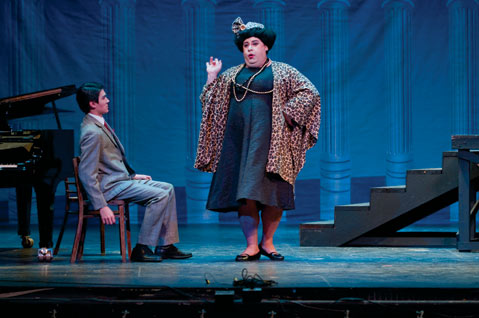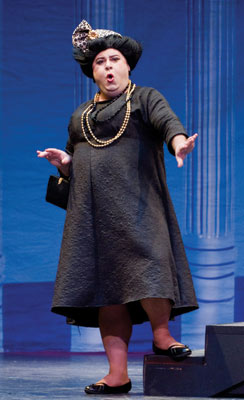Viva la Mamma! at UCSB
Donizetti's Comic Opera about Opera

Gaetano Donizetti’s Viva La Mamma!, which dates from 1831, is based on Antonio Sografi’s play and proceeds in two acts with arias sung in both English and Italian. The comic opera portrays a “typical” rehearsal of a small opera company and all of the frustrating–and silly-last minute crises that follow from that premise.
Slightly modernized but, interestingly enough, still realistic in the context of contemporary opera rehearsals, Viva La Mamma opens with the Maestra (Stephanie Turner) exaggerating her composing skills with wildly swinging arms, the librettist (Erik Bell) and the impresario (Andrew Padgett) discussing the upcoming show, Corilla (Alissa Favero) warming up her voice while her husband Stefano (Daniel Tuutau) showers her with innumerous accolades, and of course the chorus, resembling a wild bunch of groupies, rehearsing for “Romulus and Ercilia”-the looming catastrophe of an opera that is the show within the show. From there, Viva La Mamma is all about the farce of that show’s inconveniences. Much of the opera’s humor comes from the singers’ strongly exaggerated movements and expressions.

The starlet of the opera is evidently Corilla, with her curly blond hair, wide mouth that stretches to those high soprano notes-and don’t forget the immense ego. Her husband can’t stop singing of his wife’s talent, and doesn’t mind sharing her vanity. Then there’s Mr. Hot-Shot, Guglielmo Antol-whatever (Adam Phillips), the tenor who can’t really reach his high notes. As if the rehearsal weren’t filled with enough pride already, it’s then that the real diva comes in, Mamma Agatha-played by Emil Cristescu, a male baritone. An immense character both in appearance and presence, Mamma wears herself out singing “her” famous baritone aria as she imitates the instruments’ sounds until she’s out of breath. But Mamma is here for a reason; she’s here to get her daughter Luigia (Kaitlyn Fajilan) a part in “Romulus and Ercilia.” And so in the process of convincing the opera’s company of her daughter’s value, Mamma Agatha ends up getting a part herself. However, tragedy hits the comedy as a letter threatens to prevent the opera from opening as the Impresario has no money to finance the show. It’s in this final brawl that Viva La Mamma‘s big question appears at last: is opera about singing for passion or singing for money? Of course, the opera is saved by Mamma Agatha who, despite her elephant-sized pride, decides to sell her jewelry for the show to go on!



